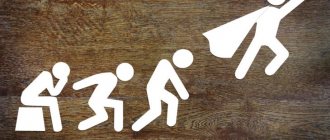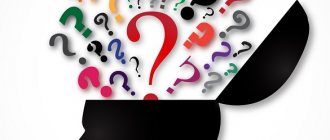In this article we will look at the concept of reflection - what it really is, what it looks like and what it is needed for. Reflection receives a lot of attention when working with social connections, so we will try to consider different approaches to its definition and application.
The term “reflect” is used more often now than ever before. It is used not only in teaching, where it is expected to constantly evaluate what is happening in the classroom, but also in everyday life - to bring about positive changes.
But what exactly is reflection?
What is reflection?
Reflection (from the Latin reflexio - to bend your back) is an important component of any activity, especially in the psychological process.
The concept of reflection has its roots in philosophy and refers to the process of an individual thinking about what is happening in his own mind.
Descartes identifies it with the ability of individuals to concentrate on their own thought process, divorced from everything external and bodily.
J. Locke distinguished between the concepts of sensation and reflection, in which reflection is a specific source of knowledge (internal experience) compared to sensation (external experience), based on the perceptions and sensations of the senses.
Among the many definitions of reflection, it is appropriate to turn to the one that has the most psychological context:
Reflection is a multi-level process of a person’s awareness of his foundations, means and methods, behavior, activities, subjective state and self-awareness (in conflict or problem situations), as well as his understanding of self-awareness and the inner world of others.
Manifestation in childhood
In fact, children lack reflection. Childhood is different in that it is an affective stage; it is a period of life where a person (child) is characterized by a quick and immediate reaction to everything. And in cases where for some reason this is not available to children, then an unconscious adaptation is activated, in which mental defense mechanisms have their own special significance.
Child and reflection
Self-observation in childhood is out of the question. Reflection “matures” in a person through contact with others, and then the development of reflection continues in a person throughout his adult life.
How to start reflecting?
- Relax. This does not have to be in a quiet room with the lights off and candles lit (it is usually difficult to find the time and place for this). Find something that helps you relax - this could be before bed or after going to the gym.
- Abstract yourself. Try to think about an event or situation from a detached perspective and recreate everything else—the feelings you had at the time, an analysis of why you felt that way.
- Ask yourself questions starting with “what,” “where,” and “why.” This not only contextualizes the situation, but also effectively initiates the assessment process.
- Be completely honest. Acknowledge what you may find difficult to admit. Sometimes it is easier to open and accept the truth to your inner self before bringing it out. Then begin to “weigh” the other factors that led to your actions.
- Reflect and learn. Reflect on your learning. Throughout the reflection process, the main aspect includes how you feel and the areas you choose to develop. Use these points of reflection when the situation arises again to improve the situation.
This is certainly not the only method of reflection. It can be used for reflection in everyday situations.
Find what suits you. Remember that reflection does not have to happen after a negative or stressful event. Try to think about events that give you positive emotions so that you can continue to experience them in the future.
In the network method, reflection can be expressed in the following forms:
- Analysis of knowledge in order to obtain new knowledge, or transformation of unclear knowledge into clear;
- Monitoring the process and condition;
- Getting out of the routine, the ability to feel and distinguish among the polyphony of opinions and voices;
- The act of research directed by a person to a problem and situation and the search for new alternatives to exit.
What is drifting is the boat. But what allows her to drift is the water, not the boat. What moves is the carriage. But what allows her to move is the ox, not the cart. Reflection is the mind. But what makes thinking possible is the will, not the mind.
It is impossible to understand why things are the way they are. Only without knowing why everything is the way it is, you do not strive for what is to come, and do not reach for what has passed.
Chinese proverb
How to use reflection to your advantage?
Any skill develops effectively only with regular use. To develop reflection, you need to practice it regularly. There are several exercises that will allow you to do this as consciously as possible:
1. Be aware of current feelings
. This is a useful habit that should be applied whenever there is a change in environment. Did you feel that your emotional state had changed? Listen to your feelings, try to understand what you feel at the moment, what worries you. Quite often, non-obvious things are discovered.
2. Highlight the situations to which you react most painfully
. Understanding which events trigger strong emotional reactions can help you identify problem areas and target them.
3. Learn to intentionally stop self-searching
. In most cases, self-digging does not bring any benefit, but only worsens your mood and reduces productivity. Fortunately, this process can be controlled intentionally. Just tell yourself that you will think about it later, but now you need to get busy.
4. Don't try to control everything
. It is impossible to control everything; some things are truly better left to chance. Allow surprises to happen from time to time, and focus on controlling the most important aspects of life.
5. In the evenings, reflect on your day
. This is a healthy habit that many successful people practice. Just think about what made this day remarkable, what useful things were done and what mistakes were made.
6. Think in detail about everything that interests you
. Choose any subject that interests you and think about its nature. Thanks to interest, this process will be uncomplicated and enjoyable, while you will develop deep analysis skills.
Definitions of reflection
In modern science, authors, within the framework of various scientific directions and practical approaches, actively study reflexive processes:
- In philosophy
A type (form) of theoretical activity aimed at understanding one’s own actions and the laws by which they are performed.
Internal activity aimed not at one’s own comprehension, but at comprehending a situation or problem in order to subsequently find a way out of it.
- In psychology
The process of self-knowledge by the subject of his mental acts and states (the basis of introspective psychology).
The process of understanding another person's condition through empathy and contemplation.
- In social psychology
Understanding by a subject (group, community) of how they are understood and accepted by other communication partners.
Understanding another person through his (her) contemplation.
- In pedagogy
Correlation with norms and standards. For Davydov, Neverovich and Samokina (1972), the concept of reflection as a specific cognitive act consists of concretizing knowledge, clarifying the foundations of knowledge, and revealing their essence through analysis and generalization.
Slastenin gives the following definition: “Reflection includes drawing conclusions, generalizations, analogies, comparisons and evaluations, as well as emotional experience, memorization and problem solving. It also involves appealing to beliefs to interpret, analyze, act on, discuss, or evaluate.”
Each person is unique; there are no standards to which it can be compared. The situation is clarified, analyzed, but not assessed.
Ideas about the situation and problems of participants in constructing a network session can be clarified, expanded, identified and generalized.
Typology of reflection
The typology of reflection developed by Semenov and Stepanov (1992) is differentiated into intellectual, personal, dialogical, communicative, cooperative, cultural and existential.
The last type of reflection is most correlated with the network approach, since it is associated with a person’s own understanding of his being and essence, with rethinking the inconsistency of being.
Existential reflection merges in unstable conditions; it is revealed in interaction with the problematic world around us and is resolved in the process of overcoming problematic situations, which is the existential ecology of personal development.
This definition of reflection overcomes the limitations of a rational understanding of it only as comprehension and criticality, which in turn corresponds only to intellectual and partly cooperative reflection as a prerequisite for cognitive and project activity.
Other types of reflection - personal, dialogical, cultural and existential - take place not only in the forms of rationalized reasoning, but mainly in intuitive insights, heuristic distinctions and irrational-sensual penetration into the deep theme of the phenomenology of being.
This being is revealed through the interaction and dialogue of a person with the world. It is on this interaction, presented in social-ecological theory, that the network method and the implementation of reflection in network therapy are based.
Taking this into account, networking with social contacts is impossible if a specialist does not develop rational and especially irrational forms of reflection.
Without this, it is impossible to become part of the experience of comprehending objective reality or to feel the inner world of another person and understand the principles of rational behavior and actions of this person.
One of the ways to cultivate existential reflection is the living experience of psychological work with meanings and the development of critical (creative) thinking in relation to the individual.
How to develop this quality in yourself?
In fact, having realized how important reflection is, a person realizes that it is necessary to develop and raise the level of reflection in oneself. Fortunately, today there are many methods and possibilities for this.
For example, a person can learn in certain situations, instead of immediately getting irritated and showing aggression, a person can ask himself questions that will be some kind of “guides” to the inner world. A person can ask himself the following questions:
Aggression
- Why can't I control myself?
- What exactly is driving me crazy right now?
- Why is it so hard for me?
- What are the external manifestations of my aggression, anger, resentment...?
- What circumstances have previously brought me to the same state?
- Why should I control myself in this situation?
When a person asks himself these and other similar questions, a picture opens up before him. A person can easily see that his reaction to a given situation is nothing more than an unlived experience of the past. And when a person realizes this, he may experience a decrease in anger, rage, and resentment.
If we return to our example with the queue, then a person may have associations with early childhood, when he kept waiting for his mother, but she did not come. No matter how strange it may seem, symbolic thinking does other things to a person. And when a person realizes this, it is much easier for him to cope with the expectation.
A person can develop reflection in himself with the help of a psychotherapist. In psychotherapy sessions, with the help of a specialist, everyone can discover the gift of knowing themselves from the inside. Naturally, in the beginning, this can be very difficult and for different people it manifests itself in different periods of time: for some it may take years, for others it can achieve success in just a month or two. It all depends on what kind of person the psychotherapist is working with. After all, the higher the degree of pain experienced by a person, the more difficult it is for him to open up.
However, after a person manages to achieve reflection, new opportunities open up before him, the quality of life and life itself change.
Reflection and psychotherapy
Currently, much attention is paid to the introduction of reflection into psychotherapeutic practice.
Vasilyuk (1984) reveals his typology of emotional experience as a meditation of levels of consciousness and identifies the level of reflection. In this mode of functioning of consciousness, both the subject of reflection and the observer are active.
Reflection is combined with a clear or unclear norm or value through which a person evaluates his activities. The result of reflection is manifested in its contradiction between the norm (value) and the real grounds for actions (behavior, actions).
This allows for the first time to understand what is happening and stimulates reflection on whether there is an underlying value or basis for action. In other words, reflection involves attention not only to a certain action, but also to its internal value foundations.
The author of this approach recommends the principle of “psychotherapeutic maieutics” to guide work with this level of reflection.
Majeutics is “Socrates’ method of dialectical debate, which consists of finding a contradiction in the interlocutor’s argumentation and bringing it to the truth by skillfully asking questions” (Vasilyuk, 1984).
Reflexivity
Within the framework of the reflexive-humanistic approach, the mechanism of reflection is understood as the comprehension and rethinking of thinking stereotypes and their heuristic overtones to the extent that it creates new (creative-innovative) content of thinking.
Within the framework of this approach, the main reflexive psychological terms are considered: reflexivity, reflexive ability, reflexive readiness and reflexive competence.
Reflexivity is a characteristic of personality types, value orientations, ways of life, distinctive features of people’s communication and interaction, during which reflection develops.
Reflective ability is the ability of a subject (individual or group) to reflect on various types and areas of their activity, that is, the ability to give a reflective quality to any process (including the process of network therapy) and functional structure.
The readiness to actualize and implement reflexive ability is called reflective readiness, which allows reflexivity to be included in the existing conditions of a person or any other system.
Reflexive competence is a professional characteristic of an individual that allows for the implementation of reflexive processes and the effective and adequate implementation of reflexive abilities. This encourages creativity and ensures maximum process efficiency.
Reflective competence is a complex entity. The subject of reflection can be an individual: knowledge about the role structure and positional organization of collective interaction; ideas about the inner world of another person and the reasons for his actions; own actions, behavior and images of oneself as an individual.
It is important to clarify those perspectives for the interpretation of reflection that allow the psychotherapist to optimize the reflexive competence of pedagogical, parental, children's and other associations in crisis situations.
Self-reflection and self-awareness
Modern therapeutic practice views reflection as a necessary basis for personal growth, responsible choices, peace of mind and psychosomatic health.
In the reflexive layer of consciousness, meanings are comprehended, meanings become objective, actions are correlated with motives, and processes with personal specificity occur.
In this case, self-reflection is when the individual himself, his needs, motives and meanings become the subject of reflection. Self-reflection is closely related to self-awareness.
The famous Russian psychologist L. S. Vygotsky considered self-reflection as one of the leading factors in personality development and pointed out “the deep difference between the unreflective, naive personality structure, on the one hand, and the reflective personality structure, on the other. Reflection can have a restructuring effect on the personality (self-tuning).”
In this context, reflection is not only self-understanding and self-knowledge, but also processes such as understanding and relating to others.
Reflection helps to achieve a correlation between one’s own consciousness, values and opinions with the values, opinions and attitudes of other people, groups, society and, finally, all of humanity.
To think about something means to “endure”, “to sift through your inner world”, to “rethink”. In the online process, reflecting means giving non-judgmental, empathic feedback to what was heard, seen and deeply felt in the session.
We see reality not as it is, but as we can see it, being who we are and using the means of vision at our disposal.
However, we often lack understanding of our own point of view and the limitations of our own vision, and we may be convinced that our vision of the world is the only correct and possible one.
One person cannot build a complete picture of the world, and one person cannot explain it. We perceive the world unambiguously, and problems arise when we begin to argue about whose perception is correct.
Often the problem is that a person, for certain reasons, does not accept the suggestions of someone else as options for solving the problem.
Such reasons may be economic, political, cultural, religious, theoretical, practical and/or related to differences in ethnicity or culture.
Accordingly, for a scientist there is a huge number of “truths”, sometimes mutually exclusive.
The world of reflection is diverse, abundant and unique for each person. In particular, the ability to reflect gives a person the opportunity to form images and meanings of life and actions and to block what he considers to be ineffective “schemes”.
An important characteristic of reflective individuals is their ability to manage their own activities in accordance with their personal values and meanings, to form and switch to new mechanisms for changing circumstances, goals and objectives or activities.
Reflection provides understanding of the past and the ability to anticipate the future.
We constantly reflect on everyday problems and situations: what went well and what did not? Why? How do I feel about this?
Reflection is a means of processing thoughts and feelings about an incident or difficult day, and it gives us the opportunity to come to terms with our thoughts and feelings about it.
Reflection can be especially helpful when dealing with a difficult or challenging situation. This type of rumination can occur when we have time to step back from something or say, “On reflection, I think you may be right,” or, “on reflection, I realize that I was upset because... "
This type of more focused thinking can lead to a new way of responding or approaching a situation next time.
When you think and write reflectively as part of your academic research, you are expected to record your reflective process and to identify and evaluate what you have learned.
Whatever you are thinking about, the following points are important:
- Reflection is the study and explanation of events, and not just their description.
- Reflection often involves identifying concerns, mistakes, and weaknesses, as well as strengths and successes.
- Usually you need to select only the most significant parts of the event or idea you are thinking about. Don't try to tell the whole story, otherwise you'll end up describing rather than thinking.
- It's often helpful to reflect on the future—where you can do something differently as a result of thinking—and also to reflect on the past.
Reflection in psychology is the basis of self-analysis
In psychology, this is one of the basic concepts on which self-analysis is built, leading to expanded awareness. A simple example: if I am not able to understand that my mood is always bad for the reason that I always think about bad things, then it is unlikely that anyone or anything will help me get out of my own suffering.
Reflexive action consists of a volitional decision to stop the endless flow of automatic thoughts and begin to become aware of oneself in the moment here and now.
To reflect means to think, analyze, and engage in self-knowledge. Correct self-analysis will help you avoid making mistakes in the future and provides answers to many important questions, both psychological and everyday.
As a result, the individual (who is this?) learns to think rationally (reflect correctly), not guided by fantasies and guesses, and also:
- control and analyze mental flow;
- evaluate your own thinking;
- frees oneself from unnecessary, destructive thought forms;
- gains the ability to make informed choices;
- reveals his hidden abilities and resources.
A person with a low level of reflection commits the same erroneous actions every day and suffers from this.
On the other hand, the term “reflect” is often applied to people who are acutely experiencing something, begin to engage in soul-searching, worry, and get nervous (breaking their fingers).
Let's say he was told that everyone around him is an idiot and he begins to try it on, not himself, gets offended, becomes constrained, reflects, i.e. looking for the bad in himself. This is an extreme that should be avoided. In everything (and especially in self-examination) moderation is needed.
If you want to change yourself and your life, but at the same time you live “automatically,” then this is the path to disappointment and suffering. You need to learn to reflect correctly (without fanaticism and humiliation, soberly, objectively).
Constructive reflection is useful. This is when you draw the right conclusions from your self-analysis and use this knowledge in the future so as not to step on the same rake.
Destructive reflection is extremely harmful. Focusing on the problem, on your wrong (from your point of view) behavior does not help you, but on the contrary, exhausts you. You begin to feel guilty and cannot get rid of this feeling. Sometimes only Gestalt therapy helps to get out of this state.
By the way, it is the bourgeoisie who want to force us to reflect, plunging our faces into the dark spots of our history (Stalinism, repressions). It is precisely the formation of feelings of guilt that they want to achieve. Everyone has dark spots, but it is beneficial that only we, and not the residents of their countries, focus on this.
What is reflective writing?
Reflective writing is evidence of reflective thinking.
In an academic context, reflective thinking and writing can be organized into three stages:
- identify the subject of reflection (an event, something that happened, a critical incident at the placement site or the progress of a group project);
- look closely at what happened, including your thoughts, feelings and reactions at the time; analyze what happened in depth or from multiple perspectives, often using your subject's theory to explore and understand the event;
- think carefully about what you have learned throughout the reflective process and how your understanding has developed, and finally identify key points for further development, both personal and professional.
Reflective writing is more personal than other forms of academic writing, but still needs a formal structure. It is necessary to be able to identify the different stages of reflection (as described above).
This is possible within one short text, such as the one below.
A short example of basic reflective writing:
“Although there was a cooperative atmosphere within the group, no one seemed willing to make decisions about how to distribute tasks. Eventually, I took a step forward and made a list of tasks and people, but I knew this might be seen as an unfair way to proceed.
I knew I was pushing people to take action, but I thought it was important that we get to work on the project as soon as possible. The important question is how groups make joint decisions.”
Smith (2009) comments on the importance of consensus in group decision making and how this promotes “positive interdependence.” However, establishing this level of cooperation in a group can be difficult.
Although we had a successful outcome, we perhaps should have found a way to include everyone in the decision-making process from the beginning. In future group work I will probably suggest this and be aware of how it will help the group dynamics from the beginning.
Structuring reflective writing
Reflective writing in a journal or your own notes can be unstructured and yet very helpful in helping you explore an idea or experience.
However, in formal academic writing, your tutor will expect to see a well-structured piece of work.
Even in a short paragraph like the previous example, you can see three broad steps: description, research and analysis, and result or conclusion:
Description (briefly)
- What's happened?
- What is being studied?
Study and analysis
- What is the most important (interesting)?
- Is this event (incident) relevant?
- How did you think (react) at that time?
- Why?
- How can this be explained further, for example through theory?
Summary (conclusion)
- What did I learn from this?
- What does this mean for my future actions (decisions)?
The above is just one brief example of how a reflective paragraph can be structured. Depending on what you are thinking about, the study of theory can be much more extensive.
It may be helpful to think of the second stage as including:
- analysis of your thoughts, feelings and reactions;
- identifying a key question that you can then “theorize”—that is, explore a little further—to improve your understanding.
Although there was a cooperative atmosphere within the group, no one seemed willing to make decisions about how to distribute tasks.
Eventually, I took a step forward and made a list of tasks and people, but I knew this might be seen as an unfair way to proceed. I knew I was pushing people to take action, but I thought it was important that we get to work on the project as soon as possible.
The important question is how groups make joint decisions.
Getting Started: Keeping a Record of Your Experience
- Take short daily notes while you are on site or throughout the course of a project.
- It's important to write something every day to remember what went well, as well as what didn't go so well.
- It is important to note that everything went well. Understanding why something went well is important if you want to positively impact the experience in the future.
A useful structure for these notes is a simple 3-step model:
- What? Note what happened and when - key details
- So what? This is how you felt and understood what happened at the time - this may include your feelings, anything that surprised you, and anything else that seemed important/useful/significant/interesting/mysterious about what happened.
This may also include stating why you felt the way you did.
- What's next? You might, for example, decide to ask the exercise leader about something that happened, or test a theory on something you saw in the exercise, or try to do something differently next time.
Notes on reflective writing style
Reflective writing is more personal than general academic writing.
In reflective writing, you can use the first person - "I" and "We" - to describe your feelings and thoughts and what influenced them. At the same time, reflection should be calm and thoughtful in tone.
You consider the feelings after this event and should not be “powered” by them, no matter how strong the emotions were at the time.
Do not write:
“I didn’t like the way she spoke in the group. She was too bossy and it upset people."
It sounds like you're still irritated and you're not trying to explore why you felt that way. You are also making a judgment - "she was too bossy" - and an assumption - "it upset people" - without providing evidence for either.
The word “bossy” here is too emotional and violates any objectivity.
More correct:
“The way she spoke to the group irritated me because I think what irritated me was the way she seemed to tell us what to do. Looking back, I realize that I didn't have any clear ideas myself at the time, and her confidence made me feel less confident in my own abilities.
This makes it clear that although you were irritated at the time, you can “step back” and explore your feelings with honesty and detachment. You also differentiate between how you saw things then and how you see them now. The tone is calm and objective.
Useful phrases for reflective writing:
- I think…
- I felt...
- I was aware...
- I understand…
- I felt awkward...
- Looking back, I now think...
- At the time I thought...looking back, I see that
Keep in mind that using these words and phrases will not necessarily make you more reflective.
Interesting test
To confirm that a person has the ability to direct thoughts to someone else’s consciousness, we will present one of the well-known tests.
Three test takers are shown the details: 3 black and 2 white caps. Then they put blindfolds and black caps on them. At the same time, they report that any of them can wear either a black or a white cap on their head.
Then the bandages are removed, and the test takers are given the following task:
- Raise your hand if you see at least one black cap;
- Leave the room if you guess which cap you are wearing.
As a result, everyone immediately raises their hand, but then there is a delay. Eventually, someone leaves the room.
This is where reflection regarding someone else’s thinking manifests itself: “Am I wearing a white cap?”, “No, if he were white, then one of the other two participants would see that the third was stretching out his hand, since he sees the black cap only on himself. But then he would go out, but he sits. So I’m wearing a black cap!”
The unique ability to reason for two other participants at once helped them guess the color of the cap. The one who came out first has more developed reflexivity than others.









